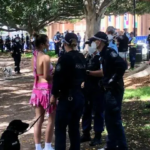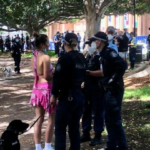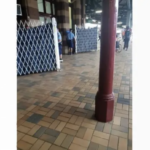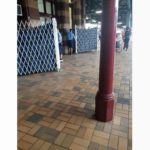NSW Police Are Strip Searching Around 100 Civilians at Public Train Stations Annually
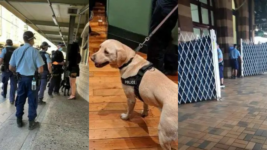
New South Wales police officers accompanied by drug detection dogs randomly searching commuters at train stations have been part of life in Sydney since NSW parliament passed laws coming into effect in February 2002, that permitted the warrantless use of sniffer dogs where trains, light rail and buses are boarded, along with licenced premises and events, such as sports games and festivals.
The idea behind the searching of civilians getting off public passenger vehicles is to locate drug dealers who might be transporting their wares via public transport. However, the criticism has always been that this defies logic as big-time dealers don’t convey their illicit substances via the train.
But if police officers accompanied by sniffer dogs monitoring commuters on their way home from work wasn’t enough of an annoyance to inflict upon the general public, the addition of a strip search in cases where an initial pat down search has proven fruitless has incrementally become a routine occurrence in this state over the past decade.
Redfern Legal Centre released new statistics this week, which show that over the eight years to June this year, the NSW Police Force has conducted close to 900 strip searches at train stations. And this means, on average, about one hundred civilians are being made to strip off as part of their commute annually, which poses all sort of civil liberties issues that are simply overlooked.
And senior police powers solicitor at RLC Samantha Lee outlines that the humiliation and trauma that strip searches regularly result in is only enhanced when an individual is ordered to disrobe at the public location, as “there is no privacy at a train station”.

False positives
Lee warned the press about the imposition of “privacy screens” at Sydney’s Central Train Station in March 2019, as this was the first time that the NSW police had deployed screens to the city’s busiest station, so that following a drug dog indicating a commuter and a pat down turning up nothing illegal, officers can then take the civilian behind a screen and ask them to remove their clothes.
“Under the law, a strip search is meant to be a last resort, it’s not meant to be the first port of call. There are other general searches which are available to police, and they are only meant to conduct a strip search in exceptional circumstances,” Lee told the ABC at the time.
But with strip search rates having increased by 50 percent over the four years prior, she didn’t think this rule was being adhered to.
Despite these warnings, however, NSW police has continued to use the screens at the major transport hub and the police force continues to be able to conduct searches upon people travelling to and from work in this entirely invasive manner.
A key issue relating to the way in which NSW police has been increasingly applying a strip search after a dog indication and a fruitless pat down is that drug detection dog indications are notoriously flawed.
The NSW Greens had been obtaining drug dog statistics over the last decade, which consistently showed drug dogs making false indications two-thirds to three-quarters of the time.
And the fact that sniffer dogs are making false positive indications and do not result in major drug hauls being located at train stations has long been known, ever since the NSW Ombudsman carried out a statutorily required two year review of drug dog operations, with its report into the matter released in 2006, finding that dog indications turned up nothing on 74 percent of occasions.
On the overwhelming number of occasions that illicit substances were actually found, what was located was a small amount of cannabis for personal use. And the ridiculous aspect to this is that in the year 2000, the NSW government rolled out the cannabis cautioning scheme, which allows officers the discretion to caution those found with a small amount of weed, twice before charging.
And in 2014, when then NSW Greens MLC David Shoebridge obtained figures clearly revealing that strip searches were increasingly being applied after failed pat down searches in response to sniffer dog indications, it appears that state law enforcement was turning to this secondary more invasive procedure in order to turn up the drugs that dogs were indicating despite these being false positives.
The majority are illegal
The total number of strip searches that NSW police carried out at NSW train stations, over the 96 months to June this year came to 883.
Nine percent of these were conducted upon First Nations people, despite their only accounting for 4.2 percent of the overall state populace. And 66 searches were conducted upon youths aged between 10 and 17.
Part 4 division 4 of the Law Enforcement (Powers and Responsibilities) Act 2002 (the LEPRA) contains the law governing strip searches. And as section 31 of the LEPRA maintains strip searches performed outside of police stations must only be carried out if the “seriousness and urgency of the circumstances make” the procedure necessary.
“We are of the view that the majority of strip searches are unlawful and continue to be unlawful because police are not meeting the very high legal threshold to conduct a strip search,” Lee told Sydney Criminal Lawyers earlier this month in relation to the “seriousness and urgency” requirement.
The lawyer added that despite recent years having seen a fall in the number of strip searches that NSW police has been conducting on the general public, the number is gradually picking up again.
The Redfern Legal Centre and Slater and Gordon have successfully launched a strip search class action against the NSW Police Force. This is due to a multitude of media reports and inquiries from the Law Enforcement Conduct Commission that reveal officers on the beat liberally applying the use of strip searches in a manner that completely disregards the LEPRA protocol and are therefore illegal searches.
To be heard in the NSW Supreme Court in May next year, the legal suit covers all people strip searched by NSW police at music festivals between 22 July 2016 and 2022.
And in terms of the ongoing strip searches at stations, Lee points out that section 33 of the LEPRA stipulates that a strip search “must be conducted in a private area”, however she explains that a train station is legally considered a “public place”, which again points to the illegal application of the procedure.
“Redfern Legal Centre is calling on the NSW government to take immediate action to reform strip search laws, which have become routinely applied by NSW police, despite these powers being intended for exceptional circumstances only,” Lee concluded.


